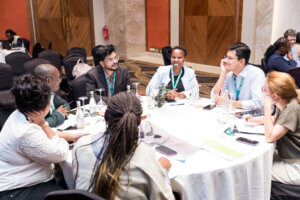Desirability > problem-solution fit
Dignitas provides innovative training and coaching to school leaders and teachers in Kenya, designed to enhance teaching quality and boost children’s learning. To date Dignitas has seen the positive impact of its in-person training and coaching model. After one year of the programme, teachers typically demonstrate 30% competency gains in critical mindsets and skills that school leaders and teachers need to improve student achievement.
When Covid-19 hit, Dignitas adapted by launching an app-based programme called LeadNow. LeadNow takes the insights, expertise, and evidence gathered from more than a decade of supporting school leaders and teachers in-person and applies that to a virtual world of training and coaching. This article reflects on how Dignitas developed a theory of change for scaling the LeadNow app-based solution.
Theory of change for scaling
A theory of change describes how an organisation conceptualises change to happen and outlines the pathway through which their programme creates change. It helps to understand goals, plan actions and evaluate our impact.
Dignitas’ existing theory of change did not cover this new app-based approach or consider the challenges of a virtual coaching model. They recognised that while evidence supports their scenario-based coaching, the LeadNow app presented distinct challenges in comparison to in-person coaching. Therefore, for successful scaling, Dignitas first needed to define its concept, test, and refine it.

Leveraging Impact at Scale Labs expertise
As a key component of the Impact at Scale Labs programme, Global Schools Forum supports participating organisations to develop a new theory of change or adapt their existing theory of change for their solution. This effort was spearheaded by expert consultant Dr. Julie Bélanger, Director at Better Purpose. Julie’s support guided Dignitas’ MEL team – Nancy Gikandi and Celestine Atieno – through a series of structured workshops and templates to develop the LeadNow Theory of Change with the wider team. Julie encouraged Dignitas to take a behaviour change lens to their work and consider how the LeadNow app targeted changing school leader and teacher knowledge, opportunity, and motivation to impact teaching behaviours in the classroom.
LeadNow Theory of Change
Julie’s guidance enabled Dignitas to craft a comprehensive Theory of Change for their LeadNow programme. This new theory of change hones in on core programme aspects of LeadNow, and the differentiation between the app-based and in-person model. This includes:
- A specific focus on foundational literacy and numeracy (FLN) teaching and pedagogical approaches to impact FLN outcomes for learners.
- SMS nudges to drive school leader engagement and completion rates.
- In-app assessment of teacher competencies.

Next steps for Dignitas
With their newly developed LeadNow Theory of Change, Dignitas is now embarking on crafting a robust monitoring evaluation and learning framework. These two cornerstones will guide Dignitas as they design and implement rapid tests to improve and refine their scale solution.
At the Impact at Scale Labs, we see a theory of change as an important early step in preparing your solution for scale. If you would like to use the tools referenced here, please refer to the Impact at Scale Toolkit Theory of Change module (coming soon).
For more information on Dignitas and their LeadNow programme:
Dignitas Project – Vibrant schools. Thriving children.
Leadnow by Dignitas Project – Vibrant schools. Thriving children.
Related Tools in Scale Toolkit
Theory of Change
MEL Framework







 Education Technology
Education Technology





